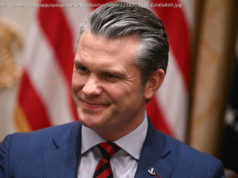It’s time to hit the panic button, people.
By Wednesday evening an unusually fractious press conference – even by President Trump’s standards – was already starting to move the news agenda swiftly away from midterms results, which showed a decisive shift towards the Democrats in many key House and Gubernatorial races, as well as on multiple ballot measures.
Trump ordered reporters to “sit down”, accused a black journalist of racism, and a testy exchange with CNN’s Jim Acosta led to the reporter’s credentials being withdrawn, over a brief and minor scuffle with a White House intern over control of his microphone.
The White House suspending a reporter’s credentials is a big story – though in a sane world, not bigger than the fallout of the midterms – and an alarming development.
But a much bigger story was brewing. The Office of the Attorney General publicly released a letter from Jeff Sessions, the department’s head. Most of it was fawning, bordering on sycophantic, boasting of the “achievements” under his tenure. But the first sentence was the one that mattered: “At your request, I am submitting my resignation”.
The seismic consequences of that sentence need some careful unpacking to understand, but it is a sentence that could rapidly plunge the US into a constitutional crisis – and that could bring a swift end to Robert Mueller as the special counsel investigating allegations of collaboration between the Trump campaign and the Russian state.
Former FBI director Mueller was appointed to investigate mounting evidence of Russian interference in the 2016 election, including allegations of collusion between at least some key Trump campaign aides, as a special counsel – a means of holding a largely (in theory) independent investigation of people close to the current president, and a similar process to the special inquiry into Bill Clinton when he was in office.
As attorney general, Sessions would typically be in charge of overseeing that investigation, but he recused himself – meaning he would have no involvement in the process – citing Department of Justice regulations. The key regulation (known catchily as 28 CFR 45.2) states employees cannot be involved “in a criminal investigation or prosecution if he has a personal or political relationship with any person or organization substantially involved in the conduct that is the subject of the investigation or prosecution”.
As a result, Sessions’ deputy attorney general, Rod Rosenstein, has been in charge of the Mueller probe virtually since its inception. During that time it has indicted, obtained guilty pleas, or convicted 32 different individuals and three corporate entities – when Republicans state that the probe is a “witch hunt”, they ignore that multiple “witches” have already been caught and pled guilty.
Trump has publicly and privately raged against the probe, and against Sessions’ decision to recuse himself from overseeing it, an act viewed as a personal betrayal by a president with little respect for legal niceties. He had publicly humiliated Sessions on multiple occasions, in what was widely seen as an effort to drive his attorney-general to resign rather than take the punches. It is a criminal offence under US law for even a president to improperly obstruct a criminal investigation.
He did not – until this week, when rather than force the president to fire him – which may have made it harder for Trump to install his handpicked successor of choice – Sessions publicly revealed he had been asked to resign, instead.
His acting successor, who can fill the post for up to 210 days without Senate confirmation, is not his deputy but rather the man who was until yesterday his chief-of-staff: Matthew Whitaker.
Prior to working in the administration, Whitaker was simultaneously involved in multiple endeavours. One was the highly partisan Foundation for Accountability and Civic Trust, where he was executive director (and the sole full-time employee), which repeatedly and publicly called for special counsel prosecution into Secretary of State Hillary Clinton.
Whitaker was also involved with a company known as World Patent Marketing, which recently settled a lawsuit (and shut down an aspect of its business) alleging it had scammed inventors out of up to $26m dollars.
He had been most visible, though, as a public critic of the Mueller probe, suggesting in articles and on CNN that the president should either stop or sabotage it, including defunding it – as a measure more subtle than publicly cancelling it.
And now he is the person in charge of that probe – as well as the rest of the US federal justice system. The Washington Post has reported this was a major factor in Trump’s thinking in the appointment – he trusted Whitaker not to recuse himself from the probe.
So far, his faith has been rewarded: oversight of Mueller has already shifted from Rosenstein to Whitaker, meaning the latter would have to sign off on any new indictments or similar action.
US politics has never been less predictable, but Whitaker is not currently expected to be Trump’s permanent nomination to the post. Either way, 210 days is a long time, and certainly enough for Whitaker to sabotage or entirely stop the Mueller investigation before making way for a successor with clean hands.
Hopefully, by now, the situation is clear: this is already a constitutional crisis which could soon become a catastrophic threat to American democracy – and the starting gun was fired within 24 hours of the end of the midterms, and months before the Democrats take their new seats in the House.
This should be the rolling biggest story in the US, and one of the biggest in the world. Just the details we already know – the ones summarised above – are deeply alarming. There will be more that we don’t, yet.
Jim Acosta will get his press pass back, when the row has served its purpose. In the meantime – as he would surely and rightly agree – we have bigger things, and more urgent ones, upon which to focus.






